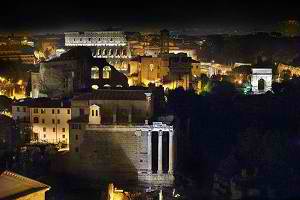
THE COLOSSEUM - THE CONSTRUCTION, THE CONTROL OF THE MASSES, SHOWS AND GLADIATORS
The largest and most impressive monument of ancient Rome is the Colosseum, located in the center of Rome with a capacity of 60,000 spectators. Originally known as the Flavian Amphitheatre, which was built under Emperor Tito Flavio Vespasian, financed as well as other public works of the period with the income of provincial taxes and spoils of war especially the loot of the temple in Jerusalem, and for political reasons as a "rectifying" gesture against the policy of the "tyrant" Nero, who had usurped the public land for his own use, thus making clear the difference between the old and the new principality.
The construction of the amphitheatre lasted from 72 to 80 AD.
Emperor Vespasian, who had wanted and had begun the work that needed to be finished, died leaving it in half and the work was finished by his son Titus, who inaugurated it with festivities lasted one hundred days.
The latest decorations were executed during the reign of Domitian, a brother of Titus, and it was named after the family of the Three Emperors.
In fact, Rome, at that time of the height of its power and glory, the capital of the Empire that included all the known world, went through particularly difficult time, five of the last six emperors had been killed and crowds of the poor and unemployed roamed through the city destroyed by Nero. To distract the masses from poverty and exclusion, and to ensure the order to a certain extent, it was given bread and circuses to all.
The people were gratified with the free distribution of food and free access to circuses.
The Colosseum had the same social role as today the stadium has.
At the entrance there were the cards that identified the person and assigned a seat and there were sold gadgets, such as plates and cups with the effigy of the gladiators, and fans, in addition to singing and screaming, brought their favorite color fabrics.
The Roman people could see the shows and had an ability to have fun, perhaps even to meet the Emperor.
In fact, the plebs, though sitting far away from the place occupied by the prince, had the illusion of participating in the games with him and sharing with him the power of life or death over the men who fought in the arena.








